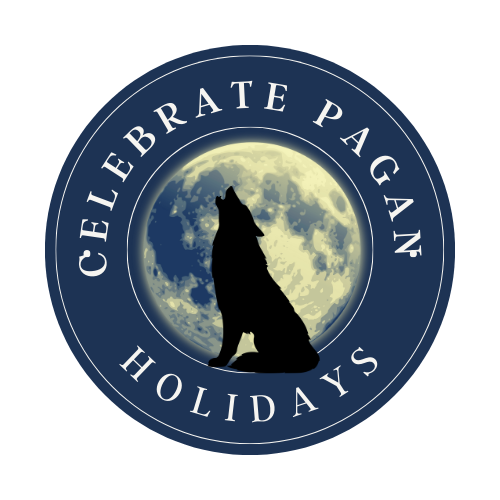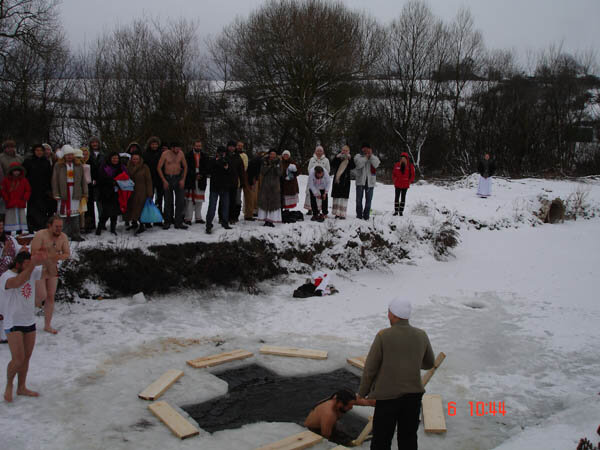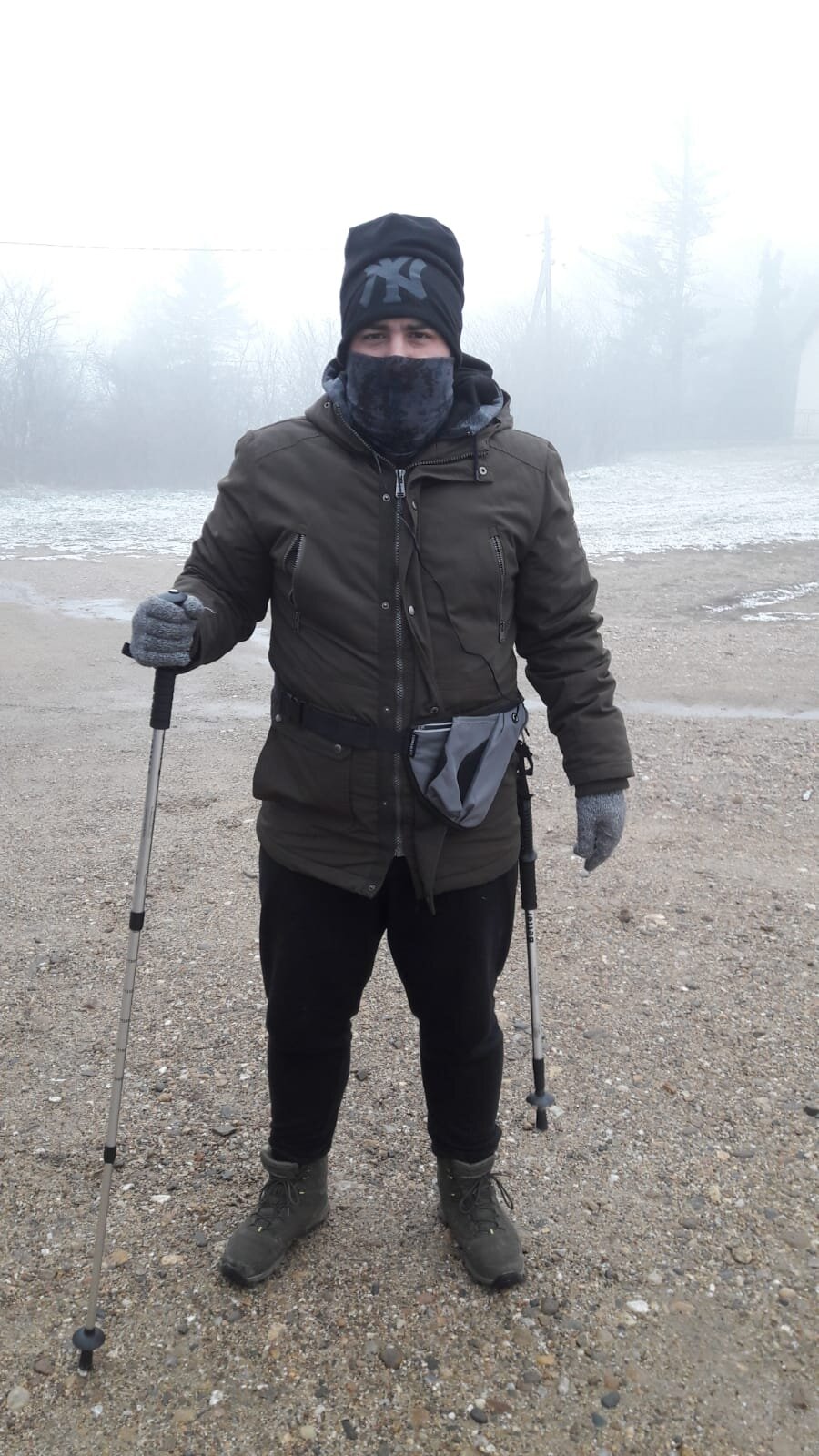Updated January 15, 2023
Vodokres, or Vodice, is a Rodnovery nature holiday in the midst of the cold days of January, at the very beginning of the New Year.
Rodnovery pagans go outside in the cold and snow and honor the natural waters, celebrating them and everything connected to them with very odd rituals!
Celebration Of Water
Vodokres is one of the unique holidays of the year where we celebrate the primary element of Water in a unique way, tying up stories behind the celebration.
In the winter the natural waters tend to freeze up or be very cold, so our ancestors developed a holiday to celebrate them in these harder days of the year so they could have better hopes of survival in the harsh winters of the lands they used to inhabit.
Bringing together your family or community for a festival or worship is special because it also raises the morale of people. During hard winters high morale and good omens were a key to survival, amongst all the other things our ancestors did such as preparation for winter in the months before.
Honoring The Elements
Rodnovery, also known as Slavic Native Faith, is a very naturalistic religion, and with that aspect comes the celebration of nature’s primary elements - earth, fire, air, and water.
Read our article The 4 Pagan Cardinal Elements to learn more about using the elements in your practice.
Most of the elements are connected to deities or festivals and are celebrated as a part of them. In previous articles about the Nature Transformation festival, you can see how Rodnovery incorporates the celebration of natural waters in this holiday.
Also, some other deities are connected to elements, such as Stribog, the deity of winds, is connected to Air, or Mokosh, the Mother Goddess, that incorporates celebration of Earth.
What Is Vodokres?
According to Rodnovery mythology, Vodokres is a special day, the 6th of January, when sparks from the heavenly forge of Svarog fall down on Earth into natural waters. After the Rodnovery New Year (starting 22nd of December until Vodokres) the link between dimensions of Jav, Prav, and Nav is very thin.
On the 6th of January on Vodokres, the link between dimensions is the thinnest so the sparks from the heavenly forge in Prav can fall freely to Jav - our plain of existence, Earth. Sparks bless the waters and they become extremely holy on this day.
One deity that is more active in winter times, Veles, is responsible to gather the sparks and blessing the waters, after which the waters get miraculous properties. Also, at the end of Vodokres, Veles is in charge of closing the doors of Nav, the Underworld, and making the link between dimensions normal again.
Read all about the diety Veles in our blog.
Vodokres In Southern Slavic Culture
In my part of the Slavic world, the South, this holiday is known as Vodice and we do have a lot of tradition surrounding it!
On this day, like many other holidays, you are supposed to wake up very early, before the light hits the day. One woman from the household is in charge of going on the break of dawn outside to get natural waters and bless them with herbs and grains with a prayer:
“As the water flows, may the fertility flow into our yields and fields”
After this, the blessed water is gathered and brought back home. Due to urbanism, not many people have access to natural waters like our ancestors had, so they leave a dish of water outside overnight and use it to bless, but sometimes it requires it to melt a bit because it can freeze!
Men of the house or community go to the natural waters like lakes, streams or rivers, in the midst of winter cold, and have a ritual bath. After that, they cut down some branches from the holy oaks and bring them home to start a fire with.
When the woman brings blessed water into the home, she leaves it on the ground next to the fireplace. In it, the wood gathered by the man is used to start a ritual fire. Next to the water dish and the fireplace stands the man of the house with an ax he used to cut the holy oak with, with his household or community, all of which are facing East where the sun is rising.
The man is in charge of the prayer:
“I went through the blade of the ax, I didn’t get cut.
I went through the fire in the pit, I didn’t get burned.
I went through the waters, I didn’t drown.
May we go through this winter blessed!”
Breakfast is the traditional feast of the day, after this tradition, where the whole family or community gathers to break bread and share a meal together!
Check out our YouTube Channel
How Do I Celebrate Vodokres?
As a somewhat solitary Rodnovery practitioner, not having Rodnovery people or communities near me, I am all alone in this practice. I incorporate all the traditions mentioned, both the ones performed by women and men!
I wake up before dawn and go to the natural waters. It’s convenient for me because near my home I have both lakes, rivers, and streams! Also, on my property, I have a natural well, so I am very blessed.
I used to use my natural well for everything because I was too young to go alone somewhere to bathe in the midst of winter, and it is not safe to do so, but in the last few years, I tend to honor the tradition in the proper way.
It requires some sneaking around.
The 6th of January is also a Christian celebration here, the day before Christmas, and it’s the day when Orthodox Christians go into forests to cut down some holy oak. It’s very hard for me to celebrate Vodokres and not run into them. They are very conservative, especially in rural parts where I am from, and they are influenced by alcohol also so I may be in danger.
It’s unfortunate that many of us have such Challenges to Being Pagan when we only wish to practice our faith in peace.
But, the tradition must be honored! I bless the water with herbs and gain and prayer and gather it. I have my ritual bath, and if it’s done around my natural well at home I just wash my face and upper body. After which I either take the time to find the holy oak or most likely I save up a branch of it from Koledo (Winter Solstice).
I use up the oak to light a fire, I have my trustworthy ax with me and the blessed water and I honor the tradition properly, after which I make breakfast for my family.
Vodokres Adapted To Christianity
My family is rather small, only my mother, my sister, and myself in my household, if we exclude a lot of pets! They are very accepting of my Rodnovery ways, enjoy my feasts, but don’t want to partake in traditions. My extended family is very Orthodox Christian oriented and I avoid them a lot.
Orthodox Christianity overtook a lot of Pagan, especially Rodnovery, traditions and adapted them to their religion so they could convert the pagan populace of the time more easily.
Vodokres didn’t survive this heist, and it’s now incorporated into Christian tradition.
On the 19th of January, Christians gather on natural waters and do a ritual swim, competing to win a holy cross that is thrown into the water.
Take Away
Blessed be our natural waters and our families in the upcoming winter! Nature during winter is also magical, especially around waters, a whole new dimension of it, so take some hours of your busy days and go out and rejoice!
Author, Marko Rajkovic is from Serbia, Europe, specializing his pagan path in his Native Slavic Faith called Rodnovery and dwelling into Wiccan solitary practices. He loves outdoor adventures, hiking and has lots of animal friends. He is one of the administrators of Pagan Chat Marko writes about Rodnovery and Wicca.






Days of Horses are a multiday Rodnovery festival celebrating this animal that starts on February 13th and ends on February 17th. Like most multiday holidays and festivals in Slavic Native Faith, this one also ends with a celebration of a deity, the three-headed god Triglav.